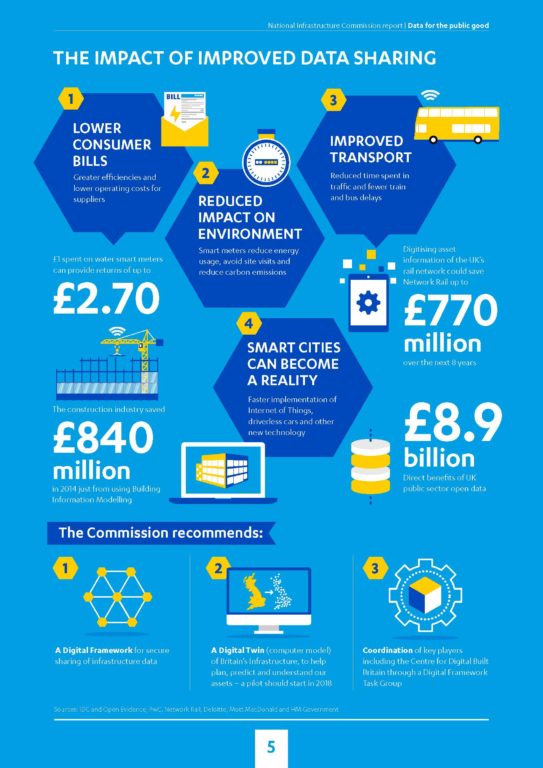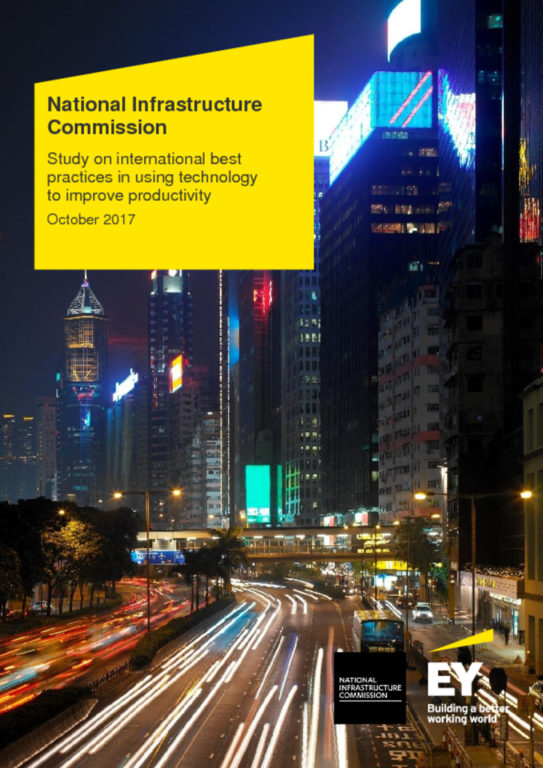Data for the public good
Status:Final report complete.
A study examining how new technologies such as AI and machine learning can improve infrastructure productivity.
Summary
In November 2016, the National Infrastructure Commission was asked to consider how new technologies like artificial intelligence and machine learning could help cut delays and disruptions across the UK’s infrastructure network.
The benefits of enabling new technologies through better infrastructure data could include:
- Cutting the numbers of delays and disruptions to train journeys by better planning maintenance and making repairs more quickly through the use of sensor networks and the application of machine learning
- Reducing the numbers of traffic jams on the roads by using smart traffic lights and other systems
- Responding to extreme weather events like snowstorms and floods in a more coordinated way
- Faster identification of leaks in the water network through data from smart water meters
- Increasing competition between mobile and broadband operators by sharing data on signal and connection speeds – helping to end intermittent services.
The Commission’s final report, Data for the public good, explores these opportunities and what action is needed to maximise them.
Next Section: Facts & Figures
This infographic illustrates the benefits of sharing infrastructure data and outlines the report's recommendations.
Facts & Figures
This infographic illustrates the benefits of sharing infrastructure data and outlines the report's recommendations.
Next Section: Recommendations
The report makes three recommendations for increasing open data sharing and maximising the opportunities this presents for infrastructure. The Government responded to the report in July 2018, broadly endorsing its recommendations.
Recommendations
The report makes three recommendations for increasing open data sharing and maximising the opportunities this presents for infrastructure. The Government responded to the report in July 2018, broadly endorsing its recommendations.
The Government should task the Centre for Digital Built Britain with the establishment of a digital framework for infrastructure data
The Government should task the Centre for Digital Built Britain (CDBB) with the establishment of a digital framework for infrastructure data, drawing together key organisations and existing initiatives both large scale (BIM) and smaller scale:
- a. A Digital Framework Task Group for infrastructure data should be established with a high profile chair who can act as a national champion for this agenda.
- b. CDBB should set out a roadmap to a digital framework to develop standards and formats for collating and sharing data.
- c. Key organisations which should be involved in the Task Group and in developing the framework include the Alan Turing Institute, Infrastructure Client Group, Construction Leadership Council, Infrastructure and Projects Authority, Cambridge Centre for Smart Infrastructure and Construction, Project 13, Office for National Statistics, Ordnance Survey, Open Data Institute and the recently announced Geospatial Commission and Centre for Data Ethics and Innovation. Wider consultation input should also be sought from the digital twin working group referenced in section 5.
- d. On standards development, in order to understand the existing standards landscape thoroughly at both a national and supranational level and to ensure agility, CDBB should consult extensively with industry on current behaviours and future requirements for how different infrastructure sectors and sub-sectors use data. CDBB may wish to commission an external standards organisation to conduct some of this work on their behalf.
- e. IPA and ICG should be engaged closely when designing final data standards and performance measures. The ICG amongst others will also be important to consult with respect to appropriate safeguards for commercial confidentiality.
- f. There should also be close collaboration with CPNI and NCSC on security requirements and levels of access and to develop standards for security, consistent with the objectives of the framework and an agreed approach to risk management.
- g. In order to support effective implementation, CDBB should also lead a scoping exercise for a framework to assess industry progress in adopting and using the framework and to measure innovation.
- h. CDBB should complete these actions and provide a public report on progress by 1 September 2018, setting out their recommendations for next steps. The National Infrastructure Commission would assess this as part of its wider role in monitoring progress against its recommendations.
The Infrastructure Client Group and the Digital Framework Task Group Chair should lead industry engagement in the framework and cultivate a shift towards minimum levels of commercial confidentiality
The Infrastructure Client Group (ICG) and the Digital Framework Task Group Chair should lead industry engagement in the framework and cultivate a shift towards minimum levels of commercial confidentiality.
- a. ICG should report to CDBB on current industry compliance with minimum levels of commercial confidentiality agreed with CDBB in recommendation 1.
- b. ICG should work collaboratively with industry and the Digital Framework Task Group to identify opportunities to make data available and reduce the unnecessary use of commercial confidentiality (e.g. through reviewing and revising existing digital contracts), and should set out an agreed plan with milestones towards achieving the proposed shift.
- c. ICG should report on progress in reducing the application of commercial confidentiality to infrastructure data by December 2018.
The Digital Framework Task Group should work with the UK Regulators Network and relevant Government departments to review and, where possible, strengthen the role of economic regulators in driving up the quality and openness of infrastructure data
The Digital Framework Task Group (see recommendation 1) should work with the UK Regulators Network and relevant Government departments to review and, where possible, strengthen the role of economic regulators in driving up the quality and openness of infrastructure data. This should include:
- a. Participation by the UK Regulators Network in the formulation of the digital framework set up by CDBB to ensure that it is effectively aligned with regulatory work on innovation and data.
- b. Assessment of the potential role of regulators and of possible barriers within current regulatory frameworks regarding: ensuring compliance by regulated network operators and utilities with the national framework and adherence to data collection standards and formats; sharing of data to inform better understanding of asset performance and user experience; sharing of data across infrastructure sectors and the value chain to enable greater innovation in the development of new technologies and data management focused on better asset management and increased productivity.
- c. Support for CDBB’s engagement with network operators and utilities around the provision of data of verified quality to input to the development of a national infrastructure digital twin over the long term.
- d. Identification of relevant areas for further trials or studies to enable regulators, and regulated industries, to understand and demonstrate how monitoring technologies and data can support cost-effective maintenance decisions and proactive asset management, working with relevant research organisations.
CDBB should collaborate with the Alan Turing Institute and the UK Infrastructure Transitions Research Consortium in pioneering digital twin models
CDBB should collaborate with the Alan Turing Institute (ATI) and the UK Infrastructure Transitions Research Consortium (ITRC) in pioneering digital twin models with predictive capability in the UK. This initiative should draw upon the AI expertise concentrated in the UK across universities and the public and private sectors.
- a. CDBB should work with BEIS and other potential funders to take forward a digital twin pilot project to explore and experiment with the benefits of building a digital twin of a specific geographical area. CDBB, ATI and ITRC should draw upon input from the digital twin working group identified in section 5.
- b. A project review of the pilot digital twin should be completed by October 2018. This should consider the lessons learnt for any future development of larger-scale or more complex digital twins, and the most effective institutional structures to support continuing progress in this area.
Terms of reference
Context
The UK has a large existing infrastructure asset base. In some areas we need to expand our networks, hence the government’s decisions, for example, to back HS2, Hinkley Point C, and the expansion of Heathrow airport. But it is also vital that we maximise the value of our infrastructure networks by making them as productive as possible.
Emerging technologies have the potential to radically improve the way we manage our infrastructure. Data management and analytics already play a very important role. Areas like digitalisation, the internet of things, big data, and artificial intelligence will all create opportunities for improving the way we operate infrastructure, maintain existing assets, and enhance the capacity and resilience of our networks.
The UK has an excellent science and research base, and is a world leader in many of these areas. Science and research will be key aspects of the government’s industrial strategy. So there is a strong basis for encouraging the application of new technology to improve infrastructure services and build on and develop the UK’s strengths in these areas.
Scope
The government asks the Commission to:
a) Identify which emerging technologies have the most potential in terms of optimising the management, performance and maintenance of existing and future infrastructure assets to support economic growth;
b) Make recommendations to government on what actions it should consider to support the deployment of those technologies across infrastructure areas and sectors, including identifying where trial approaches may be appropriate.
The Commission may focus on a subset of technologies that it judges to have the biggest potential impact. This study should be closely linked to the work the NIC is doing to assess the country’s long-term infrastructure needs for its National Infrastructure Assessment (NIA).
In carrying out its study, the government asks the Commission to:
- Consult widely with relevant experts, including the Government Office for Science and the Council for Science and Technology
- Consider international best practice in the deployment of new technology in infrastructure
- Build on other relevant work such as the Cambridge Centre for Smart Infrastructure and Construction (CSIC) report on the transport sector, and Commission studies on 5G and Smart Power
- Consider the relationship between the UK science sector and the infrastructure industry and how well this relationship facilitates innovation and the efficient deployment of new technology in UK infrastructure
- Consider interdependencies between different infrastructure sectors
- Ensure recommendations are consistent with the Commission’s fiscal remit
- Ensure recommendations work with the market, and catalyse rather than crowd out emerging commercial strategies.
The issue of skills in the construction industry is out of scope as this will be considered in separate work taken forward by the Infrastructure and Projects Authority (IPA).
Timing
TheCommission should publish its report by the end of 2017.
Next Section: Supporting evidence
The study was supported by an open call for evidence, a literature review and four expert papers:
Supporting evidence
The study was supported by an open call for evidence, a literature review and four expert papers:
- Consultation responses to our Call for evidence
- A literature review by Arup and UCL on the Resilience of digitally connected infrastructure systems
- Research exploring the case for Data As Infrastructure
- A report by EY on International best practices in using technology to improve productivity
- A report by Deloitte on Data sharing in infrastructure
- Analysis by Mott MacDonald on Better Asset Management
Data for the public good
The Commission’s final report of its new technologies study makes a series of recommendations for ensuring the UK’s infrastructure system can benefit from harnessing new technologies.

Latest Updates

Coming up in 2024
This page shows a calendar reflecting the latest expected dates for Commission reports, publications and events. You can also sign up to receive our quarterly newsletter by entering your email address in the box at the foot of each website page.
The Digital Twin Data Challenge
Technology Study: Call for Evidence







